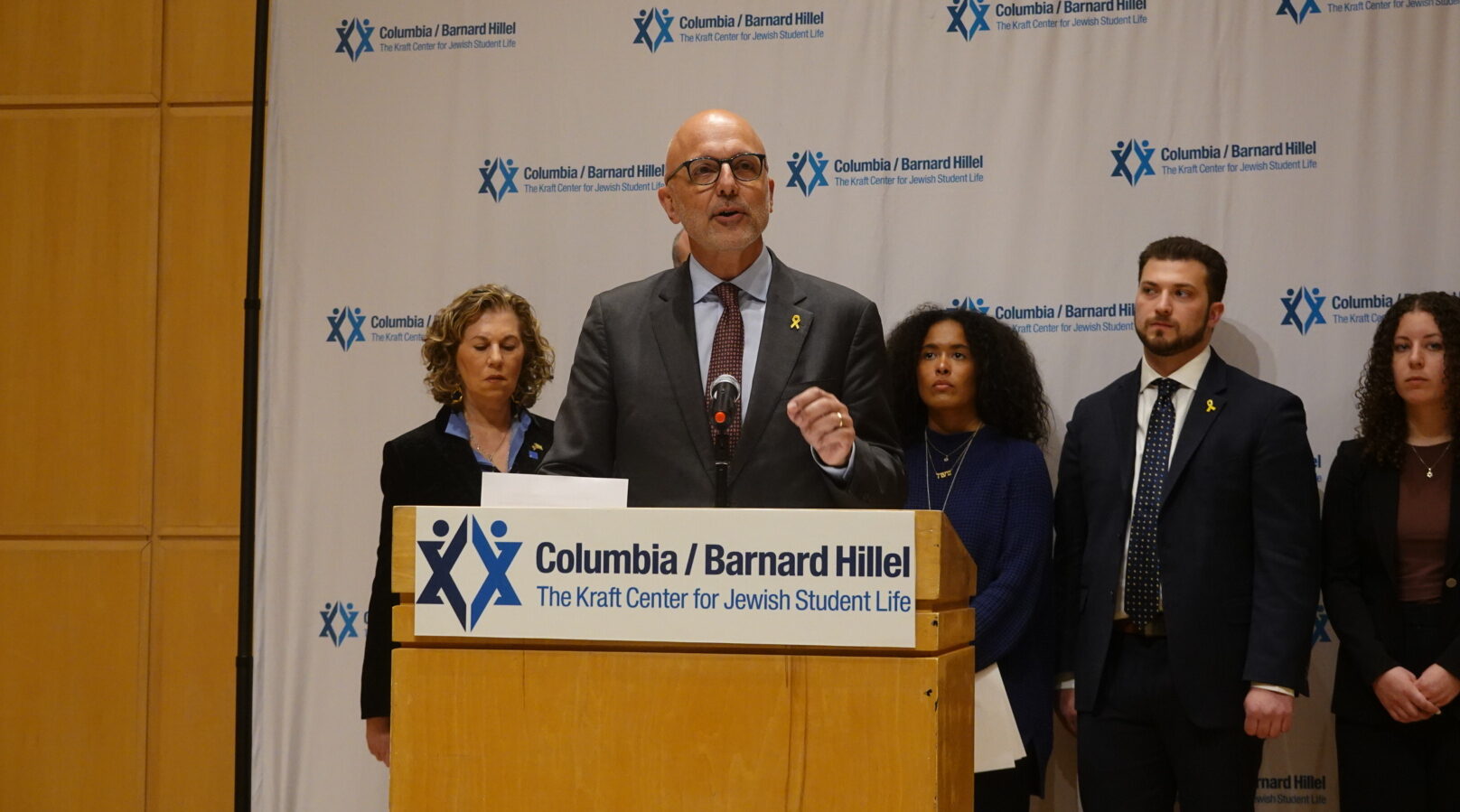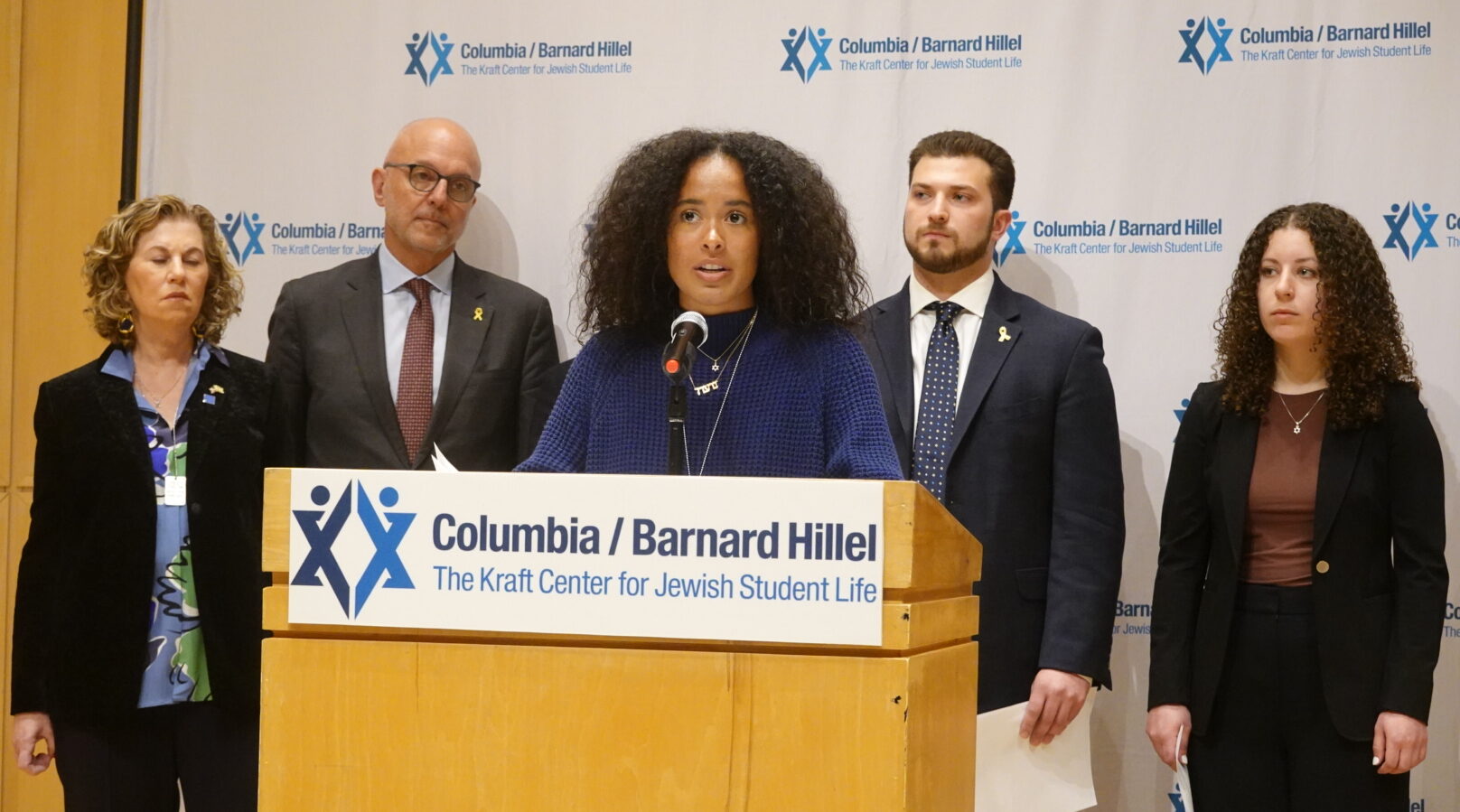Threading a needle on free speech, Jewish leaders demand Columbia rein in pro-Palestinian protests
When “the debate that’s taking place results in the intimidation and harassment and silencing of one party, there is not free speech for everyone,” said Ted Deutch, head of the American Jewish Committee

Ted Deutch, the head of the American Jewish Committee, speaks at Columbia’s center for Jewish life, April 26, 2024. (Luke Tress)
(New York Jewish Week) — Gathering at Columbia University on Friday, Jewish leaders defended the right to free speech while demanding universities take action to rein in pro-Palestinian protests that have erupted at the Ivy League school and college campuses around the country.
The protests have thrown Columbia into turmoil in the past two weeks as the administration struggles to control the unauthorized demonstrations and fend off critics who have said they are not doing enough to clamp down on antisemitism. Administrators say they are seeking to preserve the right to free speech and free assembly, while protecting the safety and ability to learn of Jewish and Israeli students and faculty, who have said some protest activities veer into antisemitism and outright threats.
“We celebrate free speech,” the head of the American Jewish Committee, Ted Deutch, said at a briefing at Columbia University’s Kraft Center for Jewish Student Life on Friday.
“But when the debate that’s taking place results in the intimidation and harassment and silencing of one party, there is not free speech for everyone,” Deutch said in response to a question from the New York Jewish Week. That “is free speech only for those who are carrying out this intimidating behavior, this harassment.”
Supporters of the protests have decried what they call efforts to control the demonstrations as an attack on the rights to free speech and free assembly.
“Columbia should not be calling the cops on its own students for engaging in nonviolent protest,” New York City Comptroller Brad Lander, the city government’s highest Jewish elected official, said last week on X after Columbia summoned the NYPD to campus, resulting in more than 100 arrests.
“The university has a long history of respecting free speech on campus, and I support the faculty who are pleading with their administration to continue that tradition,” Lander said.
Adam Lehman, the head of Hillel International, also backed the right to free speech while demanding action to rein in the protests at the Friday briefing.
“Our students are desperate for dialogue, but what is happening on campus today is not about free speech, it’s about wrongful conduct, it is about assault, it is about intimidation, it is about targeted harassment,” Lehman said in response to a question from the New York Jewish Week.
Asked about concerns Jewish institutions could be seen as opponents of free expression, Lehman said, “We can’t control perception,” especially at this moment.
“We are living in a backwards, upside down world,” Lehman said, citing campus protesters supporting “Hamas ideology.”
“It’s hard to trust perception from anyone at this point,” he said.
Hillel International has documented nearly 1,400 instances of campus antisemitism since Oct. 7, and the rate of incidents is increasing, Lehman said.
Jewish students at the briefing said the atmosphere for Jewish supporters of Israel has become fraught to the point that it interferes with their ability to learn, with protesters harassing them on campus and professors altering class schedules or participating in the protests. Columbia’s commencement, scheduled for May 15, is also in doubt, as the protesters have occupied the center of campus where the ceremony takes place.
The University of Southern California said Thursday it had canceled its May graduation ceremony after similar protests and arrests on its campus.
“I cannot walk around my own campus looking visibly Jewish without preparing myself for the possibility that someone might spit on or attack me,” said Noa Fay, a Columbia undergraduate.
“To both my university administration and those around the country, help us, your Jewish students, protect ourselves. You know it is the right thing to do,” Fay said.
Fay compared Jews who have joined the pro-Palestinian protests to “Blacks for Trump or gays for Trump.”
“They are not representative of our community,” said Fay, pointing to data that shows the vast majority of Jews identify with Israel.

Noa Fay, a Columbia undergraduate, speaks at the campus’s center for Jewish life, April 26, 2024. Linda Mirels, president of UJA-Federation of New York, and Ted Deutch, head of the American Jewish Committee, are at left in the photo. (Luke Tress)
Deutch, Lehman and other leaders at Friday’s briefing — including Linda Mirels, president of UJA-Federation of New York and Brian Cohen, executive director of Columbia Barnard Hillel — rallied around a similar solution: for universities to enforce their existing policies on protests.
Columbia provides student groups with guidelines that allow protests during designated times at certain locations. Some student protesters have ignored those rules since soon after Oct. 7.
The protests “cannot occur 24 hours a day, seven days a week, in locations where students live and learn,” Cohen said, adding that the existing rules allow protests while providing students with the opportunity to “continue their academic pursuits without fear.”
He urged Columbia to “uphold your codes of conduct, enforce your rules and hold students who violate them accountable in real and consequential ways.” The university was negotiating with the protesters, but the substance of the talks was not known to the Jewish community, Cohen said.
The protests on campus and adjacent to the university have seen demonstrators block Jewish students’ access to the public areas; calls for Hamas to target Jews; call for the destruction of Tel Aviv; and the verbal harassment of Jews with statements such as “go back to Europe” and “all you do is colonize.” Campus protesters said they can’t be responsible for non-students joining the demonstrations on or near the campus.
In video from earlier this year that surfaced this week, one of the student leaders of the protests said “Zionists don’t deserve to live,” sparking outrage. The student, Khymani James, said on Friday that he was “wrong” to make the statements, while blaming “far right agitators” for the opprobrium.
The protesters have demanded the university divest from Israeli companies, cut ties with Israeli academic institutions and issue a statement supporting a permanent ceasefire in Gaza and condemning the Israeli military campaign.
The students set up a protest encampment in the center of campus earlier this month as Columbia’s president, Minouche Shafik, addressed a congressional investigative committee on antisemitism. The university called in the NYPD to clear the unauthorized demonstration, charging more than 100 students with trespassing and further inflaming campus tensions. Student protesters expanded their demands to include barring police from campus and amnesty for students arrested or suspended over the protests.
The Columbia campus has been largely blocked to outsiders. Shai Davidai, an outspoken and controversial Israeli professor advocating for Jews on campus, had his access to campus restricted last week.
The protest encampments have spread to other New York universities in recent days, including New York University, the New School, the Fashion Institute of Technology and the City College of New York, part of the public City University of New York system.
Jewish members of Congress visited the Kraft Center last week, voicing alarm about the safety of Jewish students and vowing to take action.
Robert Kraft, the owner of the New England Patriots and a leading sponsor of the center, on Monday indicated that he was pausing donations to the university “until corrective action is taken.”
Issues surrounding anti-Israel activism came to the fore at Columbia shortly after the Oct. 7 attack on Israel. In October, an Israeli student was assaulted with a stick by a 19-year-old, who was charged with hate crimes. Columbia banned its chapters of Students for Justice in Palestine and the anti-Zionist Jewish Voice for Peace in November for violating protest policies. The groups remain banned, but continue to operate as the lead groups in a consortium of student organizations.
Last month, student activists hosted pro-Hamas speakers at an unauthorized “Resistance 101” event in campus housing.
In addition to the Congressional investigative committee that questioned Shafik this month, the Department of Education is investigating complaints — by both Jewish and Muslim parties — that Columbia violated the Title VI anti-discrimination law. Jewish students have also filed civil lawsuits alleging discrimination on campus.
This article originally appeared on JTA.org.















